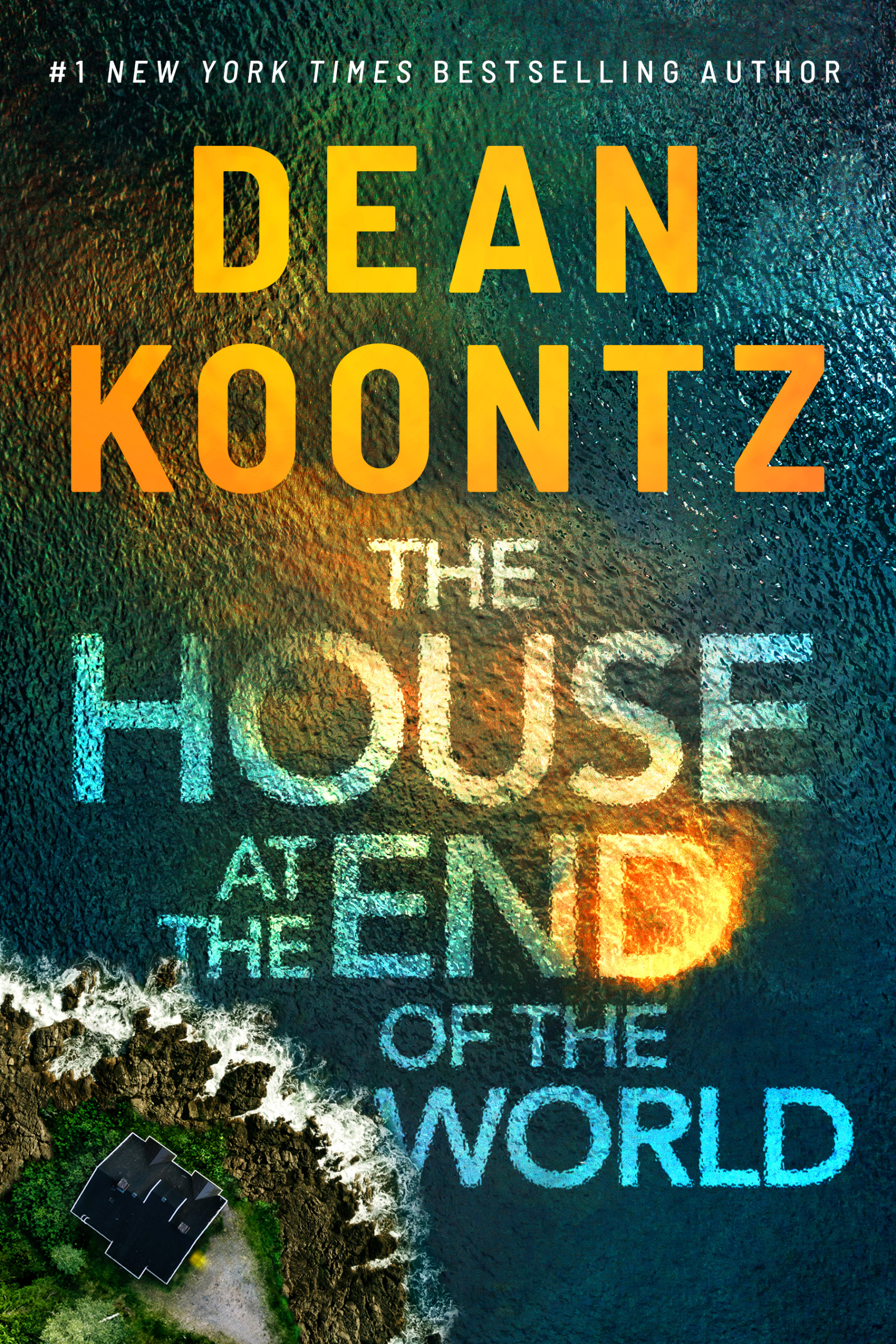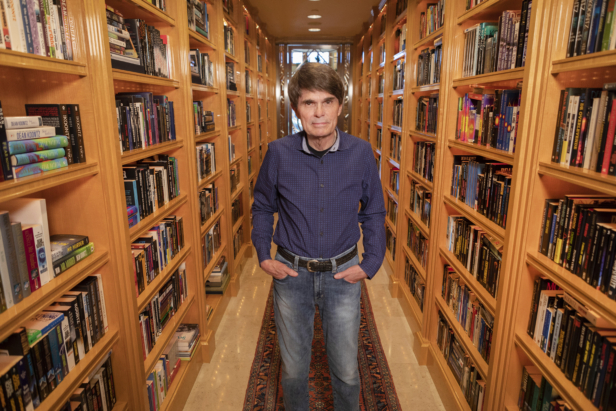Genre author legend, Dean Koontz, returns to our bookshelves this month with his sci-fi horror The House at the End of the World, which follows Katie, who is living alone on a small island (named Jacob’s Ladder) following a devastating tragedy.
However, Katie’s isolation is short-lived after strange occurrences on Ringrock, a neighboring island, where there are rumours of secret government experiments. Katie soon finds herself in an epic and terrifying battle with a mysterious enemy. But Katie’s not alone after all: a brave young girl appears out of the violent squall. As Katie and her companion struggle across a dark and eerie landscape, against them is an omnipresent terror that could bring about the end of the world…
We spoke to Koontz to find out more about the novel, who his favourite horror villains are and what he has in store for us next…
What is The House at the End of the World about?
It’s about 98,000 words. It’s about as twisty as a cascading ristra of red chili peppers, though it won’t burn your tongue while you’re reading it. It’s about Katie, an artist who has lost everything in a tragedy of epic dimensions. Escaping a society that is in decline and may soon fall, she moves to a remote island, where she is the only inhabitant; however, her true refuge is not really the island but her art. She is fleeing from the narcissism, arrogance, and deceit of the ruling class, but soon discovers that she has escaped none of that and has in fact run full-speed into a horror far worse.
When did you first get the idea for The House at the End of the World?
I believe I was seven, having just read all of Camus and most of Proust. I was giving serious consideration to a career as a novelist, though I was equally enchanted with visions of myself as either a lion tamer or circus clown. With some reluctance, I had to admit that my command of the language and techniques of narration were not yet mature enough to tackle such a novel. Fast forward seventy years, during which I didn’t tame any lions. At the height of the establishment’s idiotic and unscientific proclamations on a wide range of issues, I knew I was ready to write Katie’s story, in which personal responsibility and courage are superior to the power and “wisdom” of the anointed. At least that’s how I remember it.
Where did you get inspiration for the island of Jacob’s Ladder? Is it based on anywhere real?
As a reader and movie buff, I’ve always liked stories in which the lead character is confined to a limited space, alone, and without easy access to help. That’s really a metaphor for life, though it’s best not to think about that. I’ve added Jacob’s Ladder and Ringrock to the end of the Thousand Island chain that extends from the St. Lawrence River into Lake Ontario. The Great Lakes are so large that a strategically placed island can feel as isolate as if the surrounding water were a sea.
Do you think an island like Ringrock exists? If so, what do you think might be happening there?
Life imitates art all the time, so surely a Ringrock is out there under another name. I have been humbled enough by life to know that my ability to imagine the extent of human arrogance and foolishness falls far short of the true extent of that arrogance and foolishness, so whatever is happening on the real-world Ringrock is even worse than anything in my book. You should consider reading this novel as vital preparation if you hope to survive what your self-appointed betters will eventually bring down on you.
We spend a lot of the book with Katie alone on a remote island. What was it like writing from this perspective?
Well, she’s alone in the sense that she has no one to turn to for help. When in a lonely wood or other remote place, most of us have had the eerie feeling that we’re not really alone, that in fact we’re watched or even being stalked. This feeling overcomes Katie early in the book, and her instinct quickly proves right. I like the atmosphere that arises out of this circumstance, the creepy sense that there’s someone or something unknown in the next room, just outside the window or on the other side of the door. And of course there often is!
The problem for the writer is that there must be a series of reveals that surprise the reader and either deepen the mystery or make the situation more terrifying. I worried that when Katie at last got off her island, the tension and suspense would diminish. When instead everything got worse, I was fiendishly delighted. Some days I wonder about myself.

Katie has a fox companion called Michael J. What made you decide that Katie’s animal companion would be a fox?
An elephant seemed too fanciful. Anyway, eventually a character will enter the story, someone for whom Katie must take responsibility, risk her own life, and thus give her a renewed sense of meaning after the catastrophic loss that drove her to the island in the first place. Until that character appears, we need some kind of spiritual companion with which she can interact and reveal her nature, for which there is no better choice than an animal. In my work, that’s likely to be a dog. But in the grip of bleakness that drove her to Jacob’s Ladder, it’s not credible that Katie would have brought a dog. So it made sense for nature to provide her with another kind of canine, a fox whose instinct about the wrongness on the island matches Katie’s own perception.
There’s a certain kind of woman who is mentally and emotionally stronger than any man, and I have long been so intrigued by them that they have frequently been my lead characters. Chyna in Intensity. Leilani in One Door Away from Heaven. Ashley Bell in Ashley Bell. Katie is another. For all the complexities and the singularities in their characters, they share the courage and determination of a huntress, as if they are descended from Diana, goddess of the moon and hunt. As such, they often have a special connection with nature.
Where do you look for inspiration when creating monsters/villains for your books?
I look in the human heart, which is deceptive above all things.
What’s your all-time favorite horror villain/monster and why? It can be one of your own!
In the work of others: The best villain would be Hannibal Lecter as portrayed in The Silence of the Lambs, but absolutely not the Lecter who evolved into a kinky romantic lead in Hannibal and poisoned forever my memory of the glorious Clarice Starling from the first book; the best monster would be the queen and all her workers in Aliens, not just because they were scary as hell, but because Cameron subtly conveys that the species is not just the most nightmarish insectile life form ever imagined——but may be, in a truly alien sense, intelligent.
In my work: I’m fond of Edgler Vess in Intensity and of the Outsider in Watchers.
What are you reading right now?
Research material about placer mining and the process of cutting and polishing gemstones. It’s riveting stuff.
What’s next for you?
I’ve delivered After Death, which is in part a new take on the Singularity, for publication in July. Another novel more in the vein of Life Expectancy and Odd Thomas is also finished, the title currently under wraps. In a spirit of optimism and with a desire to look more with-it, I intend to buy some new jeans and sneakers.
Finally, I intend to take up the ever more popular sport of pickleball, but a variety of the game that allows players to address grievances with one another using .22-caliber pistols.
The House At The End Of The World by Dean Koontz will be published 24 January 2023 by Thomas & Mercer



